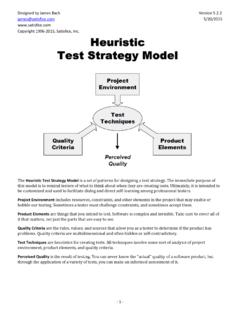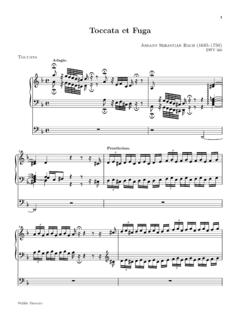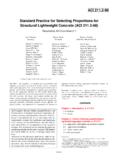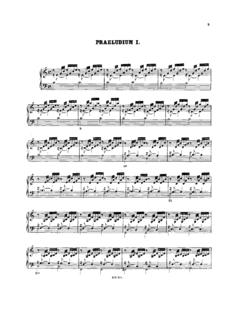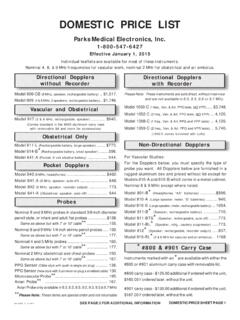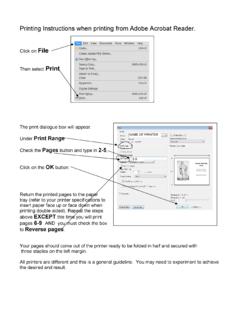Transcription of Exploratory Testing Explained - James Bach
1 Exploratory Testing Explained 4/16/03. James bach copyright 2002-2003, James bach Exploratory software Testing is a powerful approach, yet widely misunderstood. In some situations, it can be orders of magnitude more productive than scripted Testing . All testers practice some form of Exploratory Testing , unless they simply don't create tests at all. Yet few of us study this approach, and it doesn't get much respect in our field. This attitude is beginning to change as companies seek ever more agile and cost effective methods of developing software. Among the hardest things to explain is something that everyone already knows.
2 We all know how to listen, how to read, how to think, and how to tell anecdotes about the events in our lives. As adults, we do these things everyday. Yet the level of any of these skills, possessed by the average person, may not be adequate for certain special situations. Psychotherapists must be expert listeners and lawyers expert readers; research scientists must scour their thinking for errors and journalists report stories that transcend parlor anecdote. So it is with Exploratory Testing (ET): simultaneous learning, test design and test execution. This is a simple concept. But the fact that it can be described in a sentence can make it seem like something not worth describing.
3 Its highly situational structure can make it seem, to the casual observer, that it has no structure at all. That's why textbooks on software Testing , with few exceptions, either don't discuss Exploratory Testing , or discuss it only to dismiss it as an unworthy practice. Exploratory Testing is also known as ad hoc Testing . Unfortunately, ad hoc is too often synonymous with sloppy and careless work. So, in the early 1990s a group of test methodologists (now calling themselves the Context-Driven School) began using the term Exploratory , instead. With this new terminology, first published by Cem Kaner in his book Testing Computer Software, they sought to emphasize the dominant thought process involved in unscripted Testing , and to begin to develop the practice into a teachable discipline.
4 Indeed, Exploratory Testing can be as disciplined as any other intellectual activity. Microsoft practices a formalized process of Exploratory Testing for the purposes of certifying third-party applications for Windows compatibility ( ) and session-based test management ( ) is a method specifically designed to make Exploratory Testing auditable and measurable on a wider scale. Our use of the term Exploratory Testing is not in any way euphemistic. We use the words in their ordinary dictionary sense, just applied to Testing . Our use of Exploratory particularly echoes its usage in geography, as the explorers of the Royal Geographic Society, in the eighteenth and nineteenth centuries, struggled with similar issues of methodology: So, to qualify as exploration a journey had to be credible, had to involve hardship and risk, and had to include the novelty of discovery.
5 Thereafter, like cricket it was somewhat hard to explain to the uninitiated. But one element was absolutely vital;. indeed it was precisely that which distinguished the age of exploration from previous 1. ages of discovery and which necessitated the adoption of the word 'exploration.' It was, quite simply, a reverence for science.. -John Keay, The Permanent Book of Exploration Just as a star may seem dim in the spectrum of visible light, yet burn brightly in the infrared, the simple idea of Exploratory Testing becomes interesting and complex when viewed in the spectrum of skill. Consider chess. The procedures of playing chess are far less interesting than the skills.
6 No one talks about how wonderfully Emanuel Lasker followed the procedures of chess when he defeated Steinitz in 1894 to become world champion. The procedures of chess remain constant, it's only the choices that change, and the skill of the players who choose the next move. What makes Exploratory Testing interesting, and in my view profoundly important, is that when a tester has the skills to listen, read, think and report, rigorously and effectively, without the use of pre-scripted instructions, the Exploratory approach to Testing can be many times as productive (in terms of revealing vital information) as the scripted variety.
7 And when properly supervised and chartered, even testers without special skills can produce useful results that would not have been anticipated by a script. If I may again draw a historical analogy, the spectacularly successful Lewis and Clark expedition is an excellent example of the role of skill in exploration: Lewis was the diplomatic and commercial thinker, Clark the negotiator. Lewis, who went specially to Philadelphia for training in botany, zoology, and celestial navigation, was the scientific specialist, Clark the engineer and geographer as well as master of frontier men were of great intelligence, of distinguished intelligence.
8 The entire previous history of North American exploration contains no one who could be called their intellectual equal.. -Bernard De Voto, The Journals of Lewis and Clark Now, let me come back from the frontier, for a moment. Of course, tests may be worth reducing to a repeatable scripted form for a variety of good reasons. You may have special accountability requirements, perhaps, or maybe there are certain tests that must be executed in just the same way, every time, in order to serve as a kind of benchmark. Exploratory Testing is not against the idea of scripting. In some contexts, you will achieve your Testing mission better through a more scripted approach; in other contexts, your mission will benefit more from the ability to create and improve tests as you execute them.
9 I find that most situations benefit from a mix of scripted and Exploratory approaches. Exploratory Testing Defined I've tried various definitions of Exploratory Testing . The one that has emerged as the all- around favorite among my colleagues is this: Exploratory Testing is simultaneous learning, test design, and test execution. In other words, Exploratory Testing is any Testing to the extent that the tester actively controls the design of the tests as those tests are performed and uses information gained while Testing to design new and better tests. 2. In this view of ET, virtually all Testing performed by human testers is Exploratory to some degree.
10 This view treats ET as a thought process infusing much of what all good testers do, and it is found on a continuum between pure scripted Testing , prescribed completely in advance in every detail, and pure Exploratory Testing where every test idea emerges in the moment of test execution. Because of this continuum, the question Are you doing Exploratory Testing ? might be better stated as In what ways and to what degree is your Testing Exploratory ? . For the purposes of this article, when I say Exploratory Testing and don't qualify it, I mean Testing that is closer to pure ET than it is to pure scripted Testing .

